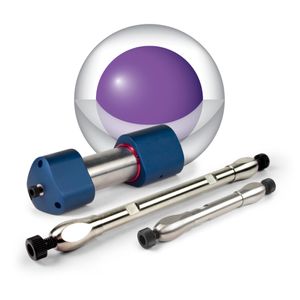Drug Discovery & Development Webinars
Browse our archive of webinars on pharmaceutical and biomedical research from collaborations between pharmaceutical companies, government, biotechnology companies and academia to create new drug discovery opportunities.
Show More
-
MAY 06, 2025 | 8:00 AMJoin us to discover how Aivia AI image analysis software enables you to quickly start your analysis, deploy intuitive AI-powered analysis for accurate detection, and batch process your analy...
-
MAY 08, 2025 | 8:00 AMLocIn is an advanced targeted integration system designed for the efficient generation of cell lines by retargeting pre-defined genomic loci, known as "landing pads." These landing pads inco...
-
MAY 08, 2025 | 8:00 AMThe HIV-1 Nef accessory factor promotes viral replication and immune escape of HIV-infected cells, making it an attractive drug target. Our team previously identified small molecules that bi...
-
MAY 13, 2025 | 9:00 AMImmune checkpoint blockade (ICB) targeting T cells has enhanced clinical outcomes in patients with renal and bladder cancers; however, response rates remain limited, particularly in cases of...
-
MAY 15, 2025 | 8:00 AMJoin us for an in-depth webinar on quantitative chemoproteomics with TMT reagents, featuring two distinguished speakers from both academia and industry. This webinar aims to bridge the gap b...
-
MAY 21, 2025 | 8:00 AMGene therapy represents one of the fastest growing biotherapeutics worldwide, with AAV at the forefront. This rapid growth is constantly challenging CMC approaches, from manufacturing throug...
-
MAY 27, 2025 | 8:00 AMThe Problem: Desalting and quantifying nucleic acids are essential for ensuring accuracy and efficiency for downstream assays, but the process can be challenging. Manual methods of desalting...
-
JUN 24, 2025 | 8:00 AMIn this webinar, Dr. Fernando Solano, Head of the Haematology Department at Hospital General Universitario Nuestra Señora del Prado, Talavera de la Reina, will discuss the implementat...
-
The upcoming webinar will delve into the advanced applications of Next Generation Flow™ in the analysis of Minimal Residual Disease (MRD) in Multiple Myeloma (MM). Dr. Juan Flores-Mont...
APR 24, 2025 | 10:00 AM
Good documentation, structured workflows, and reliable experiment tracking are essential in any lab environment. By applying digital tools like Electronic Lab Notebooks (ELNs) , educators an...
APR 24, 2025 | 8:00 AM
Join us for an insightful webinar designed to equip you with a foundational understanding of multiplexing in quantitative polymerase chain reaction (qPCR) and provide you with the knowledge...
APR 23, 2025 | 9:00 AM
This podcast delves into the innovative role of Dynabeads magnetic beads for mRNA synthesis and purification in the personalized mRNA therapeutic field. It introduces the concept of using Dy...
APR 23, 2025 | 8:00 AM
Membrane proteins are the gateway to cells and are involved in many critical functions. Each membrane protein is unique, and their complexity makes it difficult to fit into a standardized ex...
APR 17, 2025 | 8:00 AM
This webinar explores cutting-edge advancements in ultra-deep circulating tumor DNA (ctDNA) sequencing, integrating artificial intelligence (AI) and precision oncology to address critical ch...
APR 16, 2025 | 9:00 AM
BrainXell offers the most comprehensive portfolio of high-purity iPSC-derived human neurons and glia, sourced from control, edited and disease lines, to advance translational research and dr...
APR 16, 2025 | 7:00 AM
Join us for a live webinar on the latest advancements in spatial biology. Featuring two insightful presentations, learn how cutting-edge imaging and single-cell technologies are transforming...
APR 10, 2025 | 7:00 AM
Psoriatic arthritis (PsA) is a chronic inflammatory disease affecting the joints, entheses, and skin, while also increasing the risk of cardiovascular disease (CVD) and metabolic dysfunction...
APR 09, 2025 | 8:00 AM
Antibodies are a major component of adaptive immunity against invading pathogens. In this presentation, we will describe an analytical approach to characterize the antigen-specific antibody...
APR 08, 2025 | 8:00 AM
When formulating mRNA into lipid nanoparticles (LNP), various copy numbers of mRNA are encapsulated, leading to a distribution of mRNA loading levels within the LNPs. It is unclear whether t...
MAR 25, 2025 | 8:00 AM
Analytical ultracentrifugation is an established method during the development of therapeutic proteins and antibodies and contributes supporting information regarding the size, oligomerizati...
MAR 20, 2025 | 8:00 AM
Efficient viral vector production is essential for the cost-effective manufacture of cell and gene therapies. Many of the current production workflows are reliant on basal media in batch-mod...
MAR 19, 2025 | 8:00 AM
Join us for an enlightening session on the latest advancements in organoid research and drug discovery! Discover transformative applications, emerging trends, and common challenges in organo...
MAR 18, 2025 | 9:00 AM
For Research Use Only. Not for use in diagnostic procedures. The purification of plasmid DNA (pDNA) is essential in molecular biology research. Over the years, plasmid DNA isolation technolo...
MAR 06, 2025 | 8:00 AM
Fungal diseases are a growing global crisis, with increasing severity and widespread impacts. These infections, ranging from superficia...
MAR 05, 2025 | 5:00 AM
HIV drug resistance (HIVDR) can emerge with use of antiretroviral (ARV) drugs for HIV treatment and prevention. The increasing prevalence of drug-resistant HIV strains poses a serious threat...
FEB 26, 2025 | 8:00 AM
Dr. Fraser's research is focused on the discovery and validation of diagnostic and prognostic biomarkers for complex diseases, including renal dysfunction, long-COVID, and sepsis. By leverag...
FEB 20, 2025 | 9:00 AM
The webinar on the Zoetis and Genedata collaboration will cover key topics such as the challenges in biotherapeutic research, data management issues, and the need for centralized data. Atten...





























































